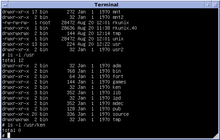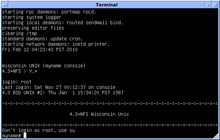SIMH
SIMH is a highly portable, multi-system emulator which runs on Windows, Linux, macOS, FreeBSD, OpenBSD, NetBSD and OpenVMS. It is maintained by Bob Supnik, a former DEC engineer and DEC vice president, and has been in development in one form or another since the 1960s.
| Developer(s) | Robert M. Supnik |
|---|---|
| Initial release | 1993[1] |
| Stable release | 3.10
/ February 24, 2019 |
| Preview release | 4.0
|
| Repository | |
| Written in | C |
| Operating system | Windows, Linux, macOS, FreeBSD, OpenBSD, NetBSD, OpenVMS |
| Platform | x86, IA-64, PowerPC, SPARC, ARM |
| Type | Hardware virtualization |
| License | MIT (modified) |
| Website | simh |
History
SIMH was based on a much older systems emulator called MIMIC, which was written in the late 1960s at Applied Data Research.[1] SIMH was started in 1993 with the purpose of preserving minicomputer hardware and software which was fading into obscurity.[1]
Emulated hardware

Version 6 Unix for the PDP-11, running in SIMH

Version 7 Unix for the PDP-11, running in SIMH
SIMH emulates hardware from the following companies.
Advanced Computer Design
- PDQ-3
AT&T
BESM
Burroughs
Control Data Corporation
Digital Equipment Corporation
GRI Corporation
- GRI-909
Honeywell
- H316
- H516
Intel
- Intel systems 8010 and 8020
Interdata
- 16-bit series
- 32-bit series
Lincoln Labs – MIT Research Lab
Manchester University
MITS
- Altair 8800 both Intel 8080 and Zilog Z80 versions
Royal-Mcbee
- LGP-30
- LGP-21
Sage Computer Technology
- Sage II
Scientific Data Systems
SWTPC
- SWTPC 6800
Xerox Data Systems
gollark: This is as a Renaissance painting or something.
gollark: I should make it make Macron.
gollark: That won't actually do anything.
gollark: Is this better? They're frolicking.
gollark: Maybe you're just being harmfully holonormative.
References
- "Preserving Computing's Past: Restoration and Simulation" Max Burnet and Bob Supnik, Digital Technical Journal, Volume 8, Number 3, 1996.
- http://www.schorn.ch/altair_5.php
External links
- Official website

- SIMH on GitHub
- Additional VAX/MicroVAX models for SIMH
- Running VAX/VMS Under Linux Using SIMH
- Debian Package
- FreeBSD Port
- UNIX: Old School. Using SIMH to explore UNIX history - Matthew Hoskins
This article is issued from Wikipedia. The text is licensed under Creative Commons - Attribution - Sharealike. Additional terms may apply for the media files.
